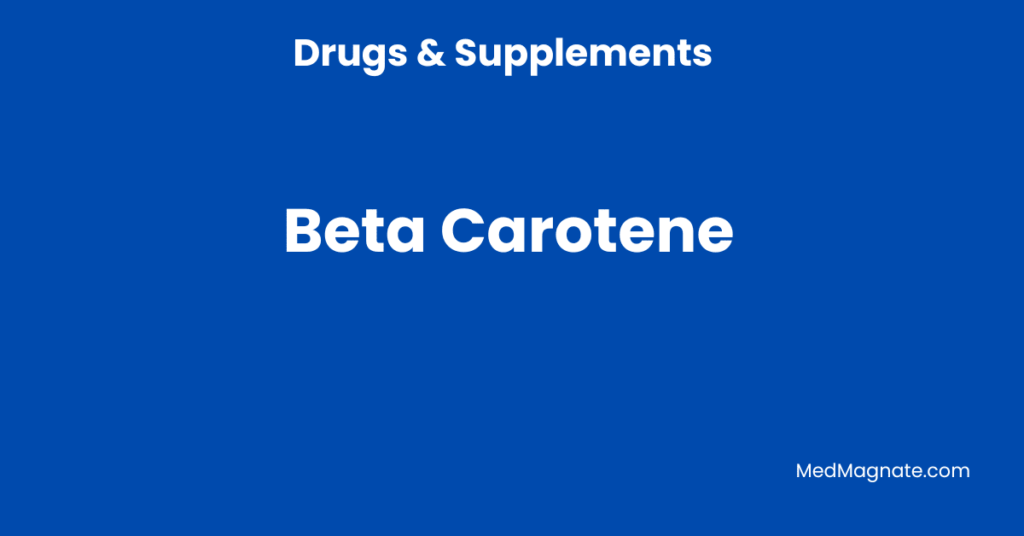Beta carotene is a type of natural pigment found in many fruits and vegetables. It gives them their bright orange, red, and yellow colors. The body converts beta carotene into vitamin A, which is essential for good vision, skin health, and a strong immune system.
It is one of the most important antioxidants that help protect the body from harmful free radicals and supports overall health.
What is Beta Carotene?
Beta carotene is a carotenoid, which is a group of plant pigments responsible for bright colors in fruits and vegetables. It acts as a provitamin A, meaning that the body can change it into vitamin A when needed.
Vitamin A plays a vital role in:
- Keeping eyes healthy
- Supporting immune function
- Maintaining healthy skin and mucous membranes
- Helping normal growth and development
Natural Sources of Beta Carotene
Beta carotene is mainly found in colorful fruits and vegetables. Some of the best food sources include:
Vegetables
- Carrots
- Sweet potatoes
- Pumpkin
- Spinach
- Kale
- Broccoli
Fruits
- Mangoes
- Papayas
- Apricots
- Cantaloupe (muskmelon)
- Red and yellow peppers
Cooking some of these vegetables (like carrots or spinach) with a little oil can help your body absorb beta carotene better, since it is fat-soluble.
Functions of Beta Carotene in the Body
Beta carotene has many important roles, such as:
- Converts to Vitamin A – Helps maintain vision, skin, and immune health.
- Antioxidant Function – Protects body cells from damage caused by free radicals.
- Supports Skin Health – Keeps the skin smooth and may help protect against sun damage.
- Boosts Immunity – Strengthens the immune system to fight infections.
- Supports Heart Health – Helps reduce oxidative stress, which may lower the risk of heart disease.
Health Benefits of Beta Carotene
1. Improves Eye Health
Beta carotene is essential for making vitamin A, which is required for good eyesight. It helps prevent night blindness and dry eyes.
2. Strengthens Immunity
It helps in the proper function of the immune system and protects the body from infections.
3. Promotes Healthy Skin
Beta carotene can help protect the skin from sun damage and maintain a healthy glow.
4. Reduces Risk of Chronic Diseases
As an antioxidant, it may help reduce the risk of diseases caused by oxidative stress such as heart disease and some types of cancer.
5. Supports Lung Health
Regular intake of beta carotene–rich foods supports respiratory health and may help in maintaining healthy lungs.
Recommended Daily Intake
There is no fixed amount for beta carotene itself, but it depends on how much vitamin A your body needs.
The recommended daily intake of vitamin A is:
- Men: 900 micrograms (mcg) per day
- Women: 700 micrograms (mcg) per day
Getting vitamin A through natural food sources rich in beta carotene is considered safe and healthy.
Beta Carotene Supplements
Beta carotene is also available in the form of capsules or tablets. These supplements are sometimes prescribed to people with vitamin A deficiency or other specific health conditions.
However, it’s always better to get beta carotene naturally from food rather than supplements unless advised by a doctor.
Possible Side Effects of Beta Carotene
Beta carotene from food sources is safe. But taking high doses of supplements can cause problems. Possible side effects include:
- Carotenemia: Skin turns yellowish or orange, which is harmless and goes away after stopping supplements.
- Smokers and drinkers: High doses of beta carotene supplements may increase the risk of lung cancer in heavy smokers or people who drink alcohol regularly.
- Nausea or stomach upset: When taken in very large amounts.
Who Should Avoid Beta Carotene Supplements?
- Smokers and former smokers should avoid high-dose beta carotene supplements.
- People with liver disease or certain skin conditions should talk to a doctor before taking it.
Getting beta carotene from natural foods is always the safest option.
Deficiency of Beta Carotene (or Vitamin A)
If the body doesn’t get enough vitamin A, it can cause:
- Night blindness
- Dry eyes and skin
- Weak immunity
- Growth problems in children
Eating fruits and vegetables rich in beta carotene helps prevent these issues.
Tips to Get More Beta Carotene Naturally
- Eat a variety of colorful vegetables and fruits every day.
- Include foods like carrots, spinach, and mangoes in your meals.
- Add a little oil when cooking these foods for better absorption.
- Choose fresh, bright-colored produce for higher beta carotene content.
Conclusion
Beta carotene is a powerful antioxidant and a natural source of vitamin A. It helps keep your eyes healthy, strengthens the immune system, and supports skin and heart health.
The best way to get enough beta carotene is by eating colorful fruits and vegetables. Supplements should only be taken under medical guidance, especially for smokers or people with certain health issues.
FAQs
1. What is beta carotene used for?
Beta carotene is used to support eye health, strengthen the immune system, improve skin condition, and prevent vitamin A deficiency.
2. What foods are rich in beta carotene?
Carrots, sweet potatoes, spinach, kale, pumpkin, mangoes, and apricots are some of the best sources.
3. Is beta carotene the same as vitamin A?
No. Beta carotene is a form of provitamin A that the body converts into vitamin A when needed.
4. Can too much beta carotene be harmful?
Yes. High doses of supplements can cause yellowing of the skin and may increase the risk of lung problems in smokers.
5. Does beta carotene help with skin health?
Yes. Beta carotene helps protect the skin from sun damage and supports smooth, healthy skin.
6. Is it better to get beta carotene from food or supplements?
It’s always better to get it from natural foods. Supplements should be taken only if prescribed by a doctor.
7. How can I increase my beta carotene intake naturally?
Eat more colorful vegetables and fruits like carrots, spinach, mangoes, and papayas regularly.

